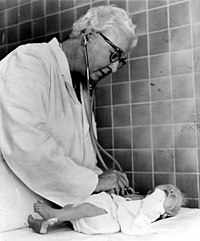
Photo from wikipedia
Low Apgar score is associated with increased risk of death in preterm or full-term infants. However, the use of Apgar score to assess extremely preterm (EP) infants is controversial. In… Click to show full abstract
Low Apgar score is associated with increased risk of death in preterm or full-term infants. However, the use of Apgar score to assess extremely preterm (EP) infants is controversial. In this study, we characterized the distribution of Apgar scores in EP infants with gestational age between 25 and 27 weeks, and investigated the association of Apgar score with survival rate at discharge by analyzing the clinical data of the EP infants discharged between January 2008 and December 2017 from 26 neonatal intensive care units in Guangdong Province, China. A total of 1567 infants with gestational age of 26.84±0.79 weeks and birth weight of 951±169 grams were involved in our study. The Apgar score increased with gestational age from 25 to 27 weeks and with time from birth from 1 to 10 min. The survival rate increased with a higher Apgar score, but no significant difference was found for 1-min Apgar score and the survival rate between infants with 25 or 26 weeks of gestation or 5-min Apgar score in infants with 25 weeks of gestation. The Apgar score is associated with survival of EP infants.
Journal Title: Brazilian Journal of Medical and Biological Research
Year Published: 2022
Link to full text (if available)
Share on Social Media: Sign Up to like & get
recommendations!